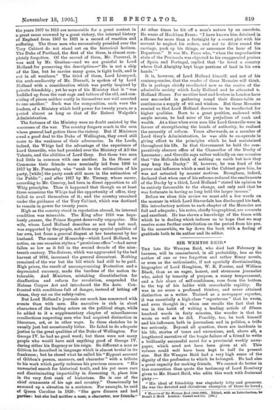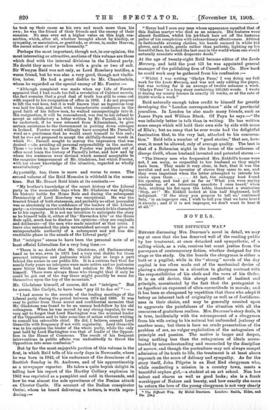SIR WEMYSS REID.*
THE late Sir Wemyss Reid, who died last February in harness, will be remembered, in all probability, less as the author of one or two forgotten and rather flimsy novels, or even as the enthusiastic, if not specially discriminating, biographer of Lord Houghton, W. E. Forster, and William Black, than as an eager, honest, and strenuous journalist who, aided by tenacity of purpose, a sunny temperament, and a fair share of self-confidence, rose from the bottom to the top of his ladder with remarkable rapidity. He was in no sense a profound thinker, and never attained distinction as a writer. Trained as a newspaper reporter, It was essentially a high-class " reporterese " that be wrote, and even thought in ; when one recalls the fact that he was in the habit of writing a leading article of fifteen hundred words in forty minutes, the wonder is that he wrote so well as he did. Possibly, too, he took himself and his influence, both in journalism and in politics, a trifle too seriously. Beyond all question, there are incidents in his life, stories of tours and excursions, and, above all, a lengthened narrative of the tragic failure of a friend to write a brilliantly successful novel for a provincial weekly news- paper, which need not have been given at all. This volume could well have been kept to half its present size. But Sir Wemyss Reid had a very high sense of the dignity of the profession to which he belonged. He had also a. great capacity for making friends. We cannot do better in this connection than quote the testimony of Lord Rosebery given to Mr. Stuart Reid, who edits this work with fraternal piety :-- " His ideal of friendship was singularly lofty and generous. He was the devoted and chivalrous champion of those he loved; he took up their cause as his own and much more than his own; he was the friend of their friends and the enemy of their enemies. No man ever set a higher value on this high con- nection, which, after all, whether brought about by kinship, or sympathy, or association, or gratitude, or stress, is, under Heaven, the surest solace of our poor humanity."
Perhaps the most important, though not, in our opinion, the most interesting or attractive, sections of this volume are those which deal with the internal divisions in the Liberal party. No doubt they must be taken with a grain or two of salt.
Sir Womyss Reid was not only, as Lord Rosebery testifies, a warm friend, but he was also a very good, though not vindic- tive, hater. He had a great dislike to Mr. Chamberlain, whom he regarded as the special enemy of Mr. Forster :— "Although complaint was made when my Life of Forster appeared that I had made too full a revelation of Cabinet secrets, the fact remains that a good deal of truth has still to come out with regard to his resignation of office in 1882. I do not propose to lift the veil here, but it is well known that an ingenious trap was laid for him, and that, with characteristic confidence in the good faith of his fellow-men, he walked unsuspectingly into it. His resignation, it will be remembered, was due to his refusal to accept as satisfactory a letter written by Mr. Parnell, in which he undertook, if he were released from Kilmainham, to give certain assistance to the Government in putting down outrages in Ireland. Forster would willingly have accepted Mr. Parnell's word as a gentleman that he would exert himself to this end ; but he was not prepared to accept the skilfully-framed words in which N r. Parnell sought to convey the impression that was desired v, !tile avoiding all personal responsibility in the matter. Those w ho wish to know how Mr. Forster was jockeyed out of office most learn the history of Parnell's letter, and how and by whom the sentences were devised which seemed acceptable to the sanguine temperament of Mr..Gladstone, but which Forster, with his closer knowledge of the situation, regarded as wholly unsatisfactory."
Arparently, too, there is more and worse to come. The second volume of the Reid Memoirs is withheld in the mean- time. But Mr. Stuart Reid hints at its contents :— " My brother's knowledge of the secret history of the Liberal party in the memorable days when Mr. Gladstone was fighting his historic battle for Home Rule and during the subsequent Premiership of Lord Rosebery was exceptional. He was the trusted friend of beth statesmen, and probably no other journalist was so absolutely in the confidence of the leaders of the Liberal party—a circumstance which was due quite as much to his character as to his capacity. It is not my intention to anticipate the story as he himself tells it, either of the Hawarden kite' or the Home Rule split, much less to disclose his opinions—they are emphatic and deliberate—of the men who made mischief at that crisis. I leave also untouched the plain unvarnished account he gives on unimpeachable authority of a subsequent and not less dis- creditable phase in the annals of the Liberal party."
But " intrigue " seems to have been the personal note of at -least official Liberalism for a very long time :—
"There is no doubt that Mr. Gladstone, old Parliamentary hand as he was, even in 1875 had a very real dislike for those personal intrigues and jealousies which play so large a part behind the scenes in our public life. It is a curious fact that for nearly forty years no intrigues were more active and no jealousies more bitter than those which had relation to Mr. Gladstone himself. There were always those who thought that if only he could be got out of the way there might possibly be room for themselves upon the top of the mountain."
Mr. Gladstone himself, of course, did not "intrigue." But he seems, like Carlyle, to have been "gey ill to dae wi' " "I had access to the records of the leading meetings of the Liberal party during the period between 1874 and 1888. It was easy to gather from these secret and confidential memoirs that Mr. Gladstone was found to be an uneasy bed-fellow by his old colleagues. When he was moved by any strong impulse, he was very apt to forget that Lord Hartington was the nominal leader of the Opposition and to take some line of action without waiting to consult his ostensible chief. He did, I believe, consult Lord Granville with frequency if not with regularity. Lord Granville was in his opinion the leader of the whole party, while the only post held by Lord Hartington was that of leader of the Opposi- tion in the House of Commons. The result of his frequent interventions in public affairs was undoubtedly to throw the Opposition into some confusion."
But by far the most enjoyable portion of this volume is the first, in which Reid tells of his early days in Newcastle, where he was born in 1842, of his endurance of the dreariness of a Scottish Sunday in St. Andrews, and of his apprenticeship as a newspaper reporter. He takes a quite boyish delight in telling how his report of the Hartley Colliery explosion in 1862 was reprinted as a pamphlet and sold in thousands, and how he was almost the sole eyewitness of the Fenian attack on Chester Castle. His account of the Italian conspirator Orsini, whom he heard delivering a lecture, is worth repro- ducing ;;---• "Never had I seen any man whose appearance equalled that of this Italian martyr who died as an assassin. - His features were almost faultless, whilst his jet-black hair set off the lustrous pallor of his complexion with extraordinary effectiveness. Attired in fashionable evening clothes, his hands encased in white kid gloves, and a smile, gentle rather than pathetic, lighting up his beautiful face, he looked the last man in the world whom one would naturally associate with desperate deeds."
At the age of twenty-eight Reid became editor of the Leeds Mercury, and held the post till he was appointed general manager of the publishing firm of Cassell and Co. How hard he could work may be gathered from his confession :— "Whilst I was writing 'Gladys Pane,' I was doing my full work for the Leeds Mercury, and was not only editing the paper, but was writing for it an average of twelve columns a week. Gladys Fane ' 18 a long story containing 160,000 words. I wrote it during my scanty leisure in exactly 16 weeks, or at the rate of 10,000 words a week."
Reid naturally enough takes credit to himself for greatly developing the "London correspondence" side of provincial jonralism. In London he also made many friends, such as James Pun and William Black. Of Payn he says :—" He was infinitely better in talk than in writing. He has written some essays which will hold their own side by side with some of Elia's ; but no essay that he ever wrote had the delightful fascination that, to the very last, attached to his conversa- tion." Reid tells a number of "good stories," that are, how- ever, it must be allowed, only of average quality. The best i3 that of a Bohemian night in the house of the authoress of George Geith, whose husband invented and patented stoves :—
"The literary men who frequented Mrs. Riddell's house were not, I am sorry, so respectful to her husband as they might have been. They made it very clear, in fact, that it was the novelist and not the inventor of stoves they came to see, and they were impatient when the latter attempted to intrude his
views upon them At last, the unhappy host found his opening, and had got as far as What you were saying reminds me of an interesting anecdote I once heard,' when Sala, striking his fist upon the table, thundered a stentorian Stop, sir!' Mr. Riddell looked at him half frightened, half indignant. If the story you propose to tell us,' continued Sala, is an improper one, I wish to tell you that we have heard it already; and if it is not improper, we don't want to hear it at all."



































































 Previous page
Previous page